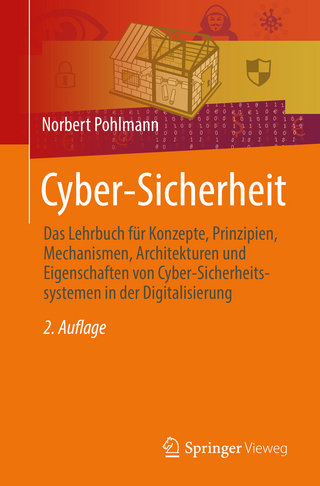
Cybersecurity Ethics
An Introduction
Seiten
2022
|
2nd edition
Routledge (Verlag)
978-1-032-16497-7 (ISBN)
Routledge (Verlag)
978-1-032-16497-7 (ISBN)
This textbook offers an accessible introduction to the topic of cybersecurity ethics. The second edition has been revised and updated, and contains new chapters on social justice, AI and big data.
This textbook offers an accessible introduction to the topic of cybersecurity ethics. The second edition has been revised and updated, and contains new chapters on social justice, AI, and Big Data.
The book is split into three parts. Part I provides an introduction to the field of ethics, philosophy, and philosophy of science, three ethical frameworks – virtue ethics, utilitarian ethics, and communitarian ethics – and the notion of ethical hacking. Part II applies these frameworks to particular issues within the field of cybersecurity, including privacy rights, surveillance, and intellectual property. The third part concludes by exploring current codes of ethics used in cybersecurity, with chapters on artificial intelligence, social diversity, Big Data, and cyberwarfare. The overall aims of the book are to:
Provide ethical frameworks to aid decision-making
Present the key ethical issues in relation to computer security
Highlight the connection between values and beliefs and the professional code of ethics
The textbook also includes three different features to aid students: "Going Deeper" features provide background on individuals, events, and institutions in cybersecurity; "Critical Issues" features contemporary case studies; and "Tech Talks" contain features that assume some familiarity with technological developments.
The book will be of much interest to students of cybersecurity, cyberethics, hacking, surveillance studies, ethics, and information science.
This textbook offers an accessible introduction to the topic of cybersecurity ethics. The second edition has been revised and updated, and contains new chapters on social justice, AI, and Big Data.
The book is split into three parts. Part I provides an introduction to the field of ethics, philosophy, and philosophy of science, three ethical frameworks – virtue ethics, utilitarian ethics, and communitarian ethics – and the notion of ethical hacking. Part II applies these frameworks to particular issues within the field of cybersecurity, including privacy rights, surveillance, and intellectual property. The third part concludes by exploring current codes of ethics used in cybersecurity, with chapters on artificial intelligence, social diversity, Big Data, and cyberwarfare. The overall aims of the book are to:
Provide ethical frameworks to aid decision-making
Present the key ethical issues in relation to computer security
Highlight the connection between values and beliefs and the professional code of ethics
The textbook also includes three different features to aid students: "Going Deeper" features provide background on individuals, events, and institutions in cybersecurity; "Critical Issues" features contemporary case studies; and "Tech Talks" contain features that assume some familiarity with technological developments.
The book will be of much interest to students of cybersecurity, cyberethics, hacking, surveillance studies, ethics, and information science.
Mary Manjikian is Professor at the College of Arts and Sciences, Regent University in Virginia Beach, USA, and a professor in the Fleet Seminar Program for the US Naval War College. She is the author of several books, including, most recently, Introduction to Cyber Politics and Policy (2020), and is co-editor of the Routledge Companion to Global Cyber-Strategy (2021).
Part I 1. What is Ethics? 2. Three Ethical Frameworks 3. The Ethical Hacker Part II 4. The Problem of Privacy 5. The Problem of Surveillance 6. The Problems of Intellectual Property Part III 7. Ethics of Artificial Intelligence 8. Cybersecurity, Diversity, Equity, and Inclusion 9. Big Data and the Ethics of Cybersecurity 10. Military Aspects of Cybersecurity Ethics
| Erscheinungsdatum | 12.12.2022 |
|---|---|
| Zusatzinfo | 5 Tables, black and white; 3 Line drawings, black and white; 3 Illustrations, black and white |
| Verlagsort | London |
| Sprache | englisch |
| Maße | 174 x 246 mm |
| Gewicht | 360 g |
| Themenwelt | Geisteswissenschaften ► Philosophie ► Ethik |
| Informatik ► Netzwerke ► Sicherheit / Firewall | |
| Mathematik / Informatik ► Informatik ► Theorie / Studium | |
| Recht / Steuern ► Privatrecht / Bürgerliches Recht ► IT-Recht | |
| Sozialwissenschaften ► Politik / Verwaltung | |
| ISBN-10 | 1-032-16497-2 / 1032164972 |
| ISBN-13 | 978-1-032-16497-7 / 9781032164977 |
| Zustand | Neuware |
| Informationen gemäß Produktsicherheitsverordnung (GPSR) | |
| Haben Sie eine Frage zum Produkt? |
Mehr entdecken
aus dem Bereich
aus dem Bereich
Das Lehrbuch für Konzepte, Prinzipien, Mechanismen, Architekturen und …
Buch | Softcover (2022)
Springer Vieweg (Verlag)
34,99 €
Management der Informationssicherheit und Vorbereitung auf die …
Buch (2024)
Carl Hanser (Verlag)
69,99 €


